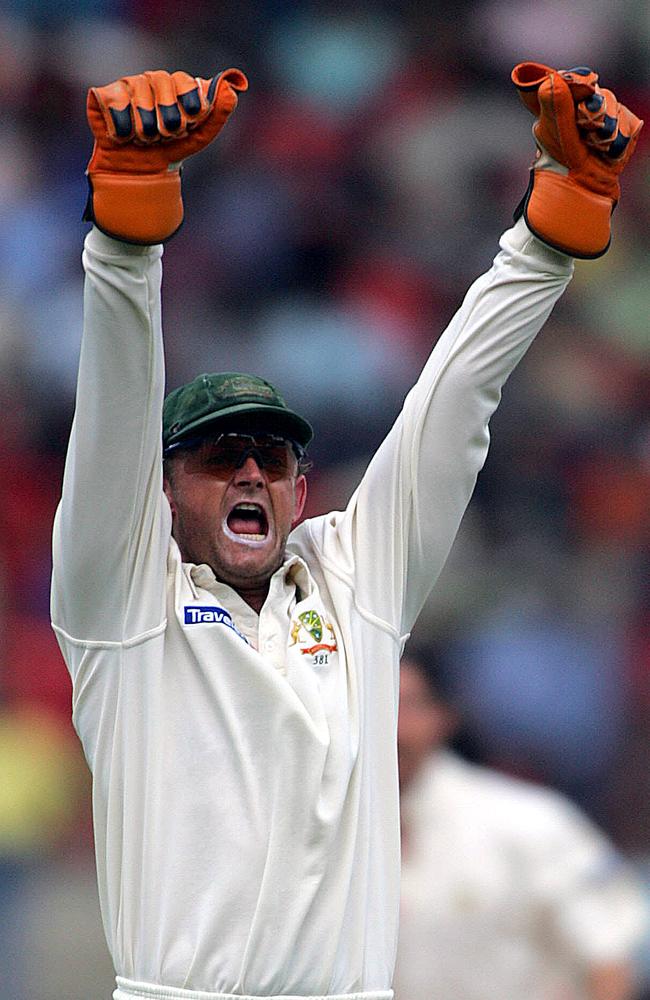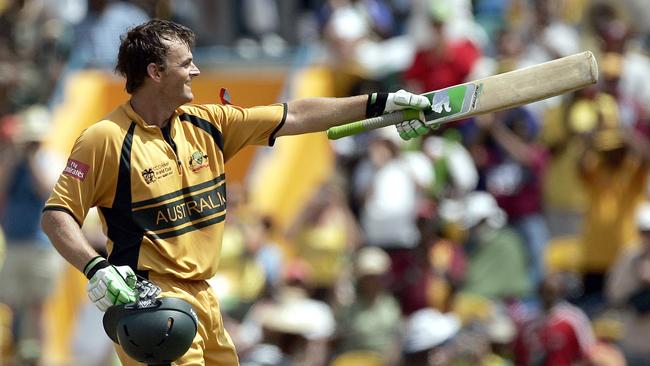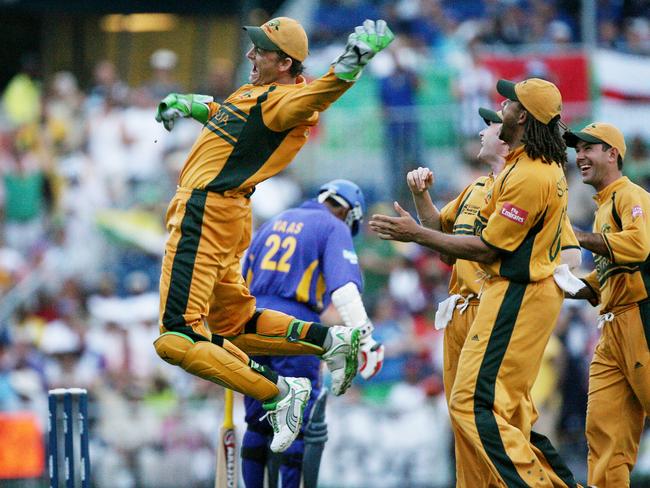Adam Gilchrist’s ‘gift’ to cricket makes him his generation’s greatest
Adam Gilchrist completely redefined what it took to be an elite wicketkeeper — and that left many of his brethren lamenting how he “stuffed it for all of us”.
Cricket
Don't miss out on the headlines from Cricket. Followed categories will be added to My News.
Whenever the late, great Richie Benaud was asked to rank cricket’s greatest players he invoked a timeless golden rule.
It was simply that the players who belonged at the very top of the list were the ones who not just dominated the game but changed the way it was played.
That, according to Benaud, was the sign of true greatness.
Judges of our top 50 male cricketers of the century have endorsed Benaud’s sentiment by naming game-changing wicketkeeper-batsman Adam Gilchrist the number one player of the first two decades of the 21st century.
Watch Australia v India Test Series Live & Ad-Break Free During Play with the Fox Cricket commentary team. New to Kayo? Get your free trial now & start streaming instantly >
Branded by Wisden as the most exhilarating player of the modern age, Gilchrist changed cricket and the game will never change back.
The shadow of his deeds has influenced selection meetings from Afghanistan to Zimbabwe and all nations in between, not just Test and one-day teams but junior sides as well for his big hitting altered the essential fabric of the game.
Before Gilchrist arrived at Test level any wicketkeeper averaging 30 was considered to be doing fine with the bat. Suddenly that number became barely a pass mark because, for a while, he doubled it.

Gilchrist raised the bar to the point where many fellow keepers would whimsically quip “Gilly stuffed it for all of us.’’
He smashed attacks and the record books with equal gusto, becoming the first player to hit 100 Test sixes.
Even though his glovework was his priority, his batting strike rate of 81.95 runs per 100 balls is bettered among long-serving Test batsmen by just one player - Indian hurricane Virender Sehwag - and he left the cavaliers of yesteryear such as Ian Botham (60.71) in the shade.
Gilchrist’s career was not simply about numbers.
His jaunty, unpretentious, country-boy demeanour was admired the world over and there were many overseas fans who had no love of the Australian cricket side but reserved special affection for Gilchrist.
When informed he had been chosen at the top of the list Gilchrist raised his eyebrows at the news.
“I’m very surprised,’’ Gilchrist said.

“I’m humbled. It’s a bit of fun. It’s a nice ego boost but I realise it’s a bit discretionary and everyone will have an own opinion for such a title.’’
Gilchrist briefly held the world record for most Test dismissals upon his retirement though his batting skills were frequently rated the superior part of his game.
People forget what a rampaging force Gilchrist was. After 47 Tests he was averaging 60.
Test great Greg Chappell, who has seen every Australian batting superstar from his boyhood hero Neil Harvey to Steve Smith, once said his favourite Test centuries were “any of the 17 scored by Adam Gilchrist.’’.
Gilchrist said his father Stan, a well known coach, shaped his cavalier attitude to the game.
“My dad laid the foundation for me. His enthusiasm for cricket I really picked up on as did all my siblings. He laid a strong foundation of the basics but always encouraged me to hit the ball. Just go for it. That saying ‘see ball, hit ball.’ Have fun. He had that mindset.’’
Like fellow keeping greats Ian Healy and Rod Marsh, Gilchrist was a hearty celebrator.
Those who visited his room after he led Australia to an historic series win over India in 2004 recall the sight of him lying in bed with beer in hand and the Border-Gavaskar Trophy partially under the covers beside him, tucked in like a child’s teddy. The stresses of a tough series were rolling off his shoulders.
Gilchrist’s game was modelled on no-one in particular but he admired many.
“I was mesmerised by anyone on television playing. I loved David Gower. Rod Marsh was a real hero of mine because at a pretty early age I picked up on the wicket-keeping side of like. I liked Deano (Dean Jones). Dennis Lillee because of his charisma… he was so big it was almost not real. When I started to get more serious about it in my teenage years guys like Ian Healy and Mark Waugh.’’

Gilchrist’s bouncy stride to the wicket radiated sunshine and positivity but there were deeper anxieties he kept well away from public view.
One of his favourite newspaper quotes was penned by the late Peter Roebuck who said ‘cricketers’ wear a cloak of bravado which hides many things.’’
The line was especially relevant when Gilchrist penned his career autobiography True Colours in which he ripped off his merry mask to reveal occasional moments of inner turmoil like the day she was in tears of anguish in the dressing room contemplating retirement before his 57-ball century in Perth against England in the 2006-07 Ashes.
“It was a really therapeutic experience doing that book. I really enjoyed dropping the guard and revealing your personality without having to back it up with performance. It can be tough at times. You feel you were being judged on a person on your results. That’s a big thing for a professional sportsman. You get up the next morning after dropping a couple of catches and you feel walking into breakfast people are judging you.
“Keeping always meant more to me than batting. I worked harder on it too. I reflect on my keeping with equal or more pride that my batting feats.’’
Gilchrist says being part of three World Cups wins and two 16-match Test winning streaks were career highlights but captaining the Australian side who won a series in India in 2004 – Australia’ sole success there in 50 years - was the gold stud.
“It was just years and years of planning and learning through the disappointments of previous experience and being prepared to flip completely the traditional game plan we had always gone from. We were prepared to take that approach and turn a tour of India on its head. We broke a 33-year drought and it hasn’t happened in 16 years since. They were special times.’’





